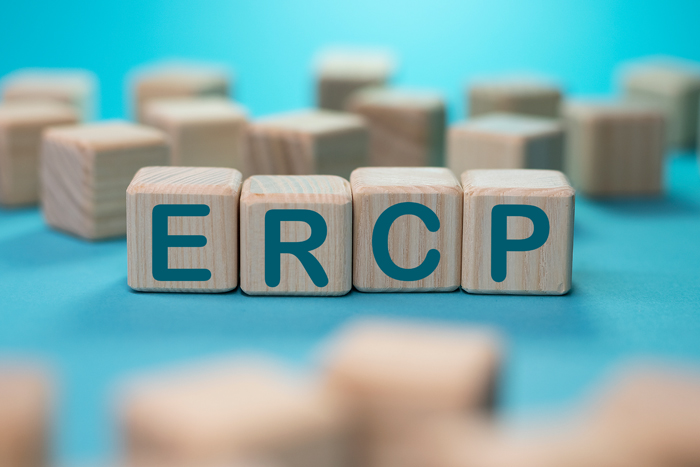ERCP Treatment & Diagnostics in Tardeo, Mumbai
ERCP
Endoscopic Retrograde Cholangio Pancreatography (ERCP) is an endoscopic procedure employed to treat gallbladder, biliary system, pancreas, and liver diseases.

What Do We Need to Know About ERCP?
It involves the combined use of X-rays and an endoscope (a thin, flexible long tube with an attached camera). The doctor will place the endoscope through the mouth and throat into the esophagus, stomach, and duodenum (initial part of the small intestine) to diagnose and treat gastrointestinal diseases.
How Is This Procedure Performed?
- This procedure is performed under local anesthesia and sedative. Sedatives offer relaxation and comfort during the process.
- The doctor will then place the endoscope via the mouth passing through the esophagus in the stomach or the duodenum. The endoscope also pumps air in the stomach and duodenum for clear visibility on the examination screen.
- During the procedure, the doctor will inject a special dye called contrast medium via the endoscope to make duct blockages and narrowed areas more visible on x-rays.
- Tiny tools are placed through the endoscope to open the blockages, remove gallbladder stones, remove duct tumors for biopsy, or insert stents. This whole process can take up to a couple of hours.
Who Qualifies for This Procedure?
ERCP is used for gastrointestinal diseases primarily involving the liver and pancreas. Your doctor may recommend ERCP if you suffer from the following:
- Jaundice
- Dark urine and lighter stools
- Bile or pancreatic stone
- Tumor in pancreas, liver, or gallbladder
- Injection in liver or pancreas
- Gallbladder stones
- Acute and chronic pancreatitis
- Liver or pancreatic cancer
- Strictures within the duct
What Are the Risks Involved With ERCP?
ERCP is a very safe procedure. But, some complications may arise in 5 to 10 percent of the cases, such as:
- Pancreatitis
- Infection in the affected part
- Excessive bleeding
- Any allergic reaction to sedatives
- Perforation in the bile or pancreatic ducts or the duodenum
- Cells and tissue damage from x-ray exposure
- You should immediately seek medical attention in case of such complications.
Request an appointment at Apollo Hospitals, Tardeo, Mumbai.
Call 1860 500 2244 to book an appointment.
Conclusion
ERCP is a beneficial medical procedure for diagnosing and treating gastrointestinal diseases involving the bile ducts, gallbladder, liver, and pancreas. It is comparatively safer than its counterparts as it is minimally invasive and has a higher success rate. Therefore, it should be part of a multidisciplinary treatment algorithm.
If you experience symptoms like dark and bloody stools, pain in the chest, shortness of breath, fever, abdominal pain, throat pain, or bloody vomit, then you must immediately consult your doctor.
Sometimes, radiology procedures or advanced surgeries like laparoscopic surgery are performed. But nowadays, ERCP is more common because it is a minimally invasive and relatively safer procedure with a higher success rate.
The patient is allowed to go home after 3 to 4 hours or a maximum of 24 hours until the effect of sedatives subsides. You may experience nausea or temporary bloating after the procedure and a sore throat for 1 to 2 days. You can switch to a regular diet once the swallowing becomes normal.
Our Doctors
DR. KEYUR SHETH
DNB (Med), DNB (Gast...
| Experience | : | 7 Yeras Experience |
|---|---|---|
| Speciality | : | General Surgery & Ga... | Location | : | Chembur |
| Timings | : | Mon to Fri : 2:00 PM... |
Our Top Specialities
NOTICE BOARD
CONTACT US
CONTACT US
 Book Appointment
Book Appointment



.svg)
.svg)
.svg)
.svg)








